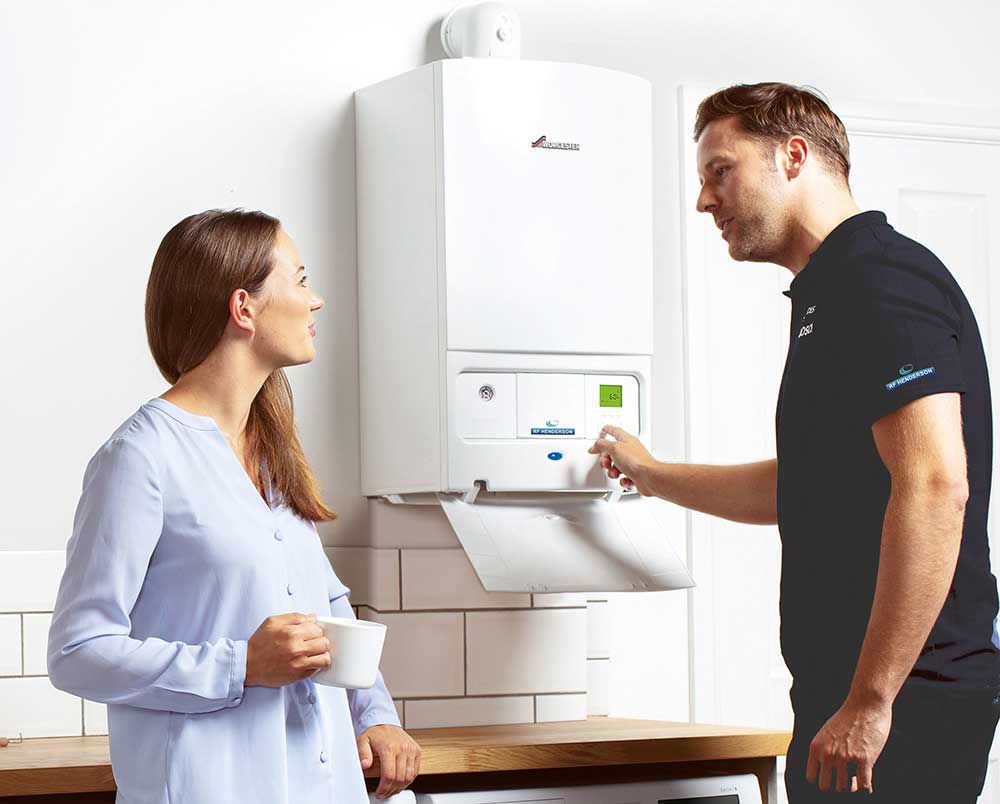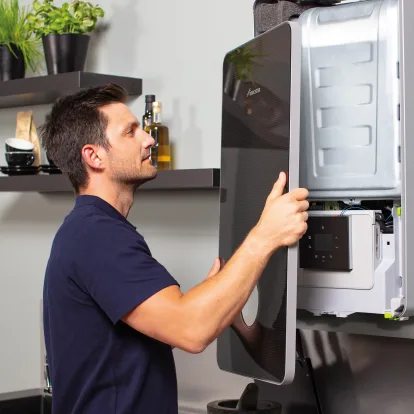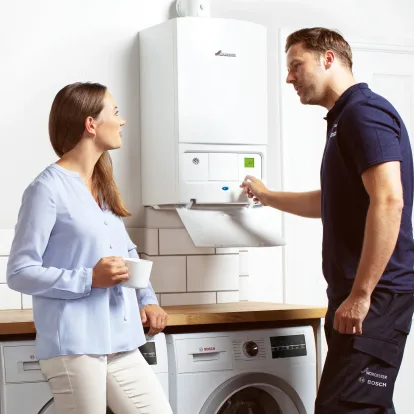What are the different types of boiler?
-
There are three main types of boilers you can install into your home: combi boilers, heat only (regular boilers) and system boilers.
The one most suitable for you and your home largely depends on your current hot water demands, but it’s also important to consider other factors, such as the age of your current heating systems and the pressure of your mains water supply.
We have a whole range of different boilers that we install, including Combi, Regular and System Boilers. Or give us a call if you’d prefer to talk it through. We like a good, old-fashioned phone call too.
How much does a new boiler cost?
-
The costs of buying a new boiler and getting it installed vary enormously, as you’d expect.
Here are a few things that influence the price you pay for a new boiler
• Type of boiler – if you’ve chosen a heat-only or storage boiler, for example, you may need to stump up for a hot water cylinder
• Brand and model – as with anything, you get what you pay for so it can be a false economy to go for the cheapest out there. A good quality boiler will last you longer and save you cash and break-down headaches in the long-run
• Size – if you’re buying a larger boiler for a bigger house, you can expect, of course, to pay more
Our experienced team of heating engineers will only install tried, tested and trusted models and they’ll give you straight, honest advice on the merits of each brand. If you’re undecided on the make and model, just give us a call and we’ll be happy to help.
Here are a few things that influence the amount you pay for getting your boiler installed
- New pipework needed and / or a change of location – when you moved in, did you inherit a boiler in an awkward location? Now’s your chance to move it to a more convenient place, but this can be expensive
- Cleaning your heating system – clear pipes and radiators are essential when you get a new boiler installed and there are different ways to do this. A power flush, for example, can cost in the region of £400
- Fitting thermostatic radiator valves – these are relatively inexpensive and can be an effective way to keep your system balanced and room temperatures comfortable
- Bigger gas supply line – for larger boilers, you may need a larger supply line between your boiler and gas meter to make sure the pressure drop isn’t too large
- Replacing one type of boiler with another – swapping a heat-only system for a combi boiler, for example, will require more labour and re-piping
If you’re worried about the additional costs that come with a boiler fitting, give us a call. We’ll help you make the right decisions and hopefully give you some peace of mind.
What are the signs I need a new boiler?
-
Sometimes, it pays to replace a boiler rather than fork out for regular repairs. Signs you need a replacement include
- Radiators are talking longer to heat up
- The boiler is giving off a bad smell
- Your boiler is making strange noises
- Your system regularly leaks
- You gas bills are going up
Boilers and central heating systems are complicated things and a simple repair by a Gas Safe-certified engineer might cure any of the problems mentioned here. But boilers suffer wear and tear like any machinery and eventually will need replacing.
Book a call-out with one of our experienced, qualified engineers to get an honest, expert opinion on your best course of action. We’ll give you as many options as possible – and our best recommendation.
How energy efficient is my boiler?
-
Most modern boilers should have an energy efficiency sticker on the boiler or in the pack that you will have been given. The rating will be clearly displayed here.
If you have an older system, check under the boiler where the pipes come out, and under the flap at the front where the dials are. Here you should find a small sticker or plate with the exact model.
Once you have the model, the best place to check the rating is to go to the Product Characteristics Database (PCDB). This is a comprehensive website with nearly every boiler ever made and it’s usually easy to find your boiler efficiency figure here. Look for the seasonal efficiency figure, which gives you the best idea of how your system performs throughout the year.
How often should I have my boiler serviced?
-
An annual boiler service with one of our Gas Safe-registered engineers makes sense if you want your boiler to continue running safely and smoothly.
Only three in 10 boilers serviced every year need a repair in their first six years, according to a Which? survey in 2021. This doubles to around six in 10 boilers when only serviced every two to five years.
So yes, spending a little on caring for your boiler now will save you a big headache further down the line.
At Sensible Heating Solutions, we provide both
- a one-off service
- a boiler cover package with annual service
There are pros and cons with either, of course. If you rely on the one-off service, you could save cash with a new and reliable boiler. But it’s a false economy if your boiler is old and on its last legs.
If you’re thinking long term, our boiler cover package gives you peace of mind and could extend the life of your machine.
What happens when you service my boiler?
-
Our Gas Safe-registered engineers are really thorough. Their checks will include
- The flue, internally and externally
- Boiler and pilot light or auto ignition
- Operating pressure and/or heat input
- Safety devices
- Case seals
- Internal components, including burner, heat exchanger, main injector and spark probe
We’ll fire your boiler safely to identify any working faults, clean parts if necessary and produce a service report showing you everything our engineer has done.
Are your heating engineers Gas Safe registered?
-
Yes, all our heating engineers are qualified and Gas Safe registered.












